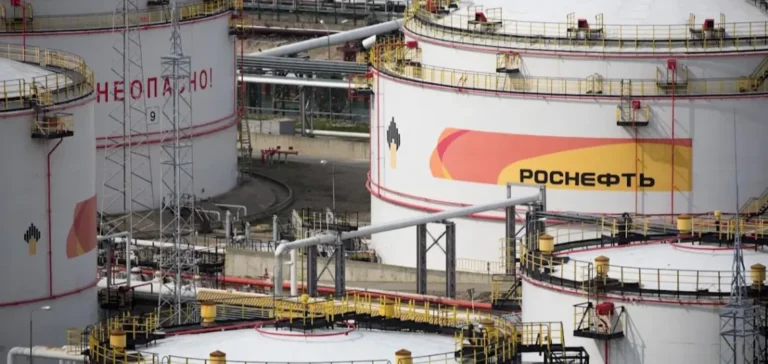U.S. authorities have decided to freeze all assets of Rosneft and Lukoil in the United States and to prohibit American companies from dealing with these groups. The executive paired this move with an explicit call for allies to join these sanctions. Ukrainian President Volodymyr Zelensky hailed a “strong message,” thanking Washington for increased pressure on Moscow. Russia’s response, voiced by its diplomacy, labeled the measures counterproductive and claimed “immunity” to Western restrictions.
Immediate shock to crude prices and transmission mechanisms
At the Asian open, West Texas Intermediate (WTI) rose 3.81% to $60.73, and Brent 3.55% to $64.81. The rise reflects heightened supply risk tied to the marketing, financing, and insurance of cargoes associated with the targeted producers. Analysts highlight the emergence of a risk premium on flows attributable to these groups, now costlier to ship and harder to settle in dollars. Russia accounts for about 11% of global crude oil production, giving any perceived disruption an amplifying effect.
Asian equities broadly declined, with the Nikkei down 1.35% to 48,641.61 points and the Topix down 0.39% to 3,253.78 points, Seoul off 0.98%, Taipei down 0.42%, while Sydney was nearly flat at +0.03% and the Hang Seng gained 0.24%. Gold firmed to $4,115 an ounce amid heightened volatility. The yen weakened to 152.55 per dollar as investors watched initial policy signals from Japan’s new head of government and potential monetary cues from the Bank of Japan (BoJ).
European course: LNG and “shadow fleet” in the crosshairs
The European Union (EU) has reached a political agreement to tighten energy sanctions, including a halt to imports of Russian liquefied natural gas (LNG) and new restrictions on the “shadow fleet” of tankers involved in cargo transfers and opaque insurance arrangements. The EU had already banned LNG transshipments via its ports and is now moving toward a full drying up of remaining flows. Russia’s share of European gas imports fell to around 15%–19% in 2024, while Russian LNG volumes hit a peak, notably via France and Spain.
New European rules target proof of origin for cargoes and restrict port access for vessels resorting to opaque practices. The pursuit of evasion schemes is becoming a stated pillar of the sanctions policy. In parallel, Washington is stepping up pressure on major buyers in Asia, notably India and Japan, to curb purchases of Russian energy. This convergence of measures aims to dry up export revenues that feed the Russian federal budget.
Why Rosneft and Lukoil are critical nodes
Rosneft claims nearly 40% of Russia’s oil production and Lukoil about 15%, forming the backbone of the country’s crude flows. Rosneft reports production near 3.7 million barrels per day of liquid hydrocarbons, Lukoil around 1.7 million barrels per day (millions of barrels per day: Mb/d). Targeting these two players increases the complexity of trading operations, cargo blending, flag changes, and insurance—core elements of global logistics.
Several refineries owned by these groups have suffered temporary shutdowns after drone attacks in recent months, affecting unit availability and the pace of refined product exports. The cumulative weight of financial, insurance, and technical constraints on processing capacity bears on the flexibility of outbound flows. Final effects, however, depend on the reallocation of barrels, the arbitration of the global fleet, and traders’ logistical levers.
Global market: OPEC+ role and demand dynamics
The Organization of the Petroleum Exporting Countries and allies (OPEC+) remains the central balancing factor, with the market recently stabilizing around $65 per barrel. Price trajectory depends on the group’s ability to adjust supply in the face of potential Russian logistical frictions. Global demand remains a key determinant, with expectations sensitive to growth signals and industrial policies. Any cyclical shift feeds through to refining, inventories, and price differentials between crude grades.
The United States replenished its strategic reserves at the start of the week, a decision interpreted as insurance ahead of a sanctions policy likely to disrupt supply. This move strengthens the response capacity in the event of prolonged tension. Currency and commodity indicators confirm a volatility regime, as investors monitor export restrictions considered by Washington toward China and policy shifts expected in Beijing.
Diplomatic dimension and political signals
The U.S. Secretary of State indicated that the dialogue channel remains open if it contributes to a pathway to peace. In Brussels, leaders are pursuing coordination of legal and logistical instruments to close maritime workarounds. The Secretary General of the North Atlantic Treaty Organization (NATO) relayed the goal of a cumulative effect of measures to influence Russian strategic calculations. Kyiv announced a letter of intent for 100 to 150 new-generation JAS 39 Gripen aircraft, while Washington does not intend to deliver Tomahawk missiles.
Russian authorities dispute the expected effectiveness of these sanctions and cite the resilience of the national economy, including energy. The U.S. President stated that exchanges with his Russian counterpart have not produced progress, while a previously envisaged meeting was postponed. Stakeholders are adjusting positions as the legal and financial arsenal deepens. Market operators, for their part, are recalibrating scenarios for flows, prices, and operational risks.






















